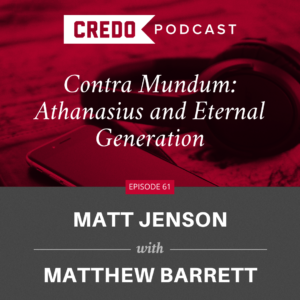Show Notes
Why did God become man? Surely this is one of the most important questions of the Christian faith. Athanasius answered this question not only to help us understand the incarnation of the Son, but who the Son is from all eternity. Over against Arians in his day who subordinated the Son, Athanasius argued that unless the Son is eternally begotten from the Father’s divine nature then he is not a Son who can save us let alone a Son we can worship as true God. Nor can we forget that orthodox trinitarianism exists today in part because Athanasius was also willing to fight tooth and nail over one letter. Against those who insisted that the Father and the Son were merely “homoiousious” (of similar essence), Athanasius spent his life convincing the Church to remove the “i,” insisting instead that the Father and the Son are “homoousious” (of the same essence). In this episode of the Credo Podcast, Matthew Barrett and Matt Jenson discuss why Athanasius was right to pick this fight, and at times even stand against the world (contra mundum) to ensure orthodoxy prevailed.
 Dr. Matt Jenson is a systematic theologian specializing in theological anthropology and ecclesiology. He holds a B.A. in literature and philosophy from Wheaton College and a Ph.D. in theology from the University of St. Andrews, where he was part of the Institute for Theology, Imagination and the Arts. He is the author of Theology in the Democracy of the Dead: A Dialogue with the Living Tradition, and The Gravity of Sin: Augustine, Luther and Barth on ‘homo incurvatus in se’
Dr. Matt Jenson is a systematic theologian specializing in theological anthropology and ecclesiology. He holds a B.A. in literature and philosophy from Wheaton College and a Ph.D. in theology from the University of St. Andrews, where he was part of the Institute for Theology, Imagination and the Arts. He is the author of Theology in the Democracy of the Dead: A Dialogue with the Living Tradition, and The Gravity of Sin: Augustine, Luther and Barth on ‘homo incurvatus in se’
Matthew Barrett is Associate Professor of Christian Theology at Midwestern Baptist Theological Seminary, as well as the founder and executive editor of Credo Magazine. He is the author of several books, including Canon, Covenant and Christology: Rethinking Jesus and the Scriptures of Israel; None Greater: The Undomesticated Attributes of God; 40 Questions About Salvation; God’s Word Alone: The Authority of Scripture; Reformation Theology: A Systematic Summary; Salvation by Grace, and Owen on the Christian Life. He is the host of the Credo podcast where he engages top theologians on the most important theological issues today.
